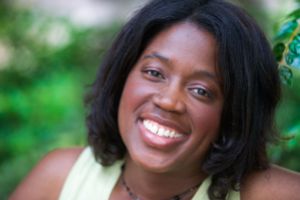
Every day, students come to Chanitra Bishop for advice about information — everything from how to find certain articles, to what books will help their research projects. Ms. Bishop certainly has the right pedigree. At Indiana University Bloomington, she’s the Digital Scholarship and Emerging Technologies Librarian at the Herman B Wells Library, which contains more than 4.6 million volumes, including special collections in African Studies, Russian and East European Studies, Uralic and Altaic Studies, East Asian Studies, and West European Studies.
“I wanted to work in the library,” says Ms. Bishop, “because I enjoy working with people, doing research, and helping people find information.”
Ms. Bishop has found that same connection with Wikipedia. In the fall of 2010, she began helping IU Bloomington students who were writing articles for the Wikimedia Foundation’s Public Policy Initiative. That initiative, which evolved into the Wikipedia Education Program, had students write public-policy-oriented articles as a formal classroom assignment. As a Wikipedia Ambassador, Ms. Bishop works not just with students but with professors in the program. One of Ms. Bishop’s first realizations: While every student already read Wikipedia, few students realized they could actually edit and contribute to Wikipedia’s articles. Students also assumed that each Wikipedia article was written in full by just one person.
“When we explain Wikipedia,” says Ms. Bishop about the volunteer instructors, “we usually go in and do an initial talk, and a lot of people are like, ‘Oh, I never knew all of that.’ I like to show one of the videos that is about the ‘Edit’ button and how people often just ignore it. Even though it’s there, it’s like it’s not there. I tell them, ‘If you see something that’s inaccurate on Wikipedia, you don’t have to wait for someone else to fix it. You can fix it yourself. You don’t even need an account; all you have to do is click ‘edit.'”
Ms. Bishop also shows students a Wikipedia article’s “History” function, “so they can also see that even though an article today might have several different sections and be may be many pages long, when it first started out, it may have been six sentences. Often it may just start off as a sentence, or a paragraph, and then the community kind of helps build that article. So it doesn’t always just start off with someone just writing all of the information. Just one person kind of gradually can build up to its current state. So a lot of students also are surprised to see the initial, first view of the article.”
From her initial volunteering in 2010, Ms. Bishop is now Wikipedia Regional Ambassador for Indiana, Illinois, and Ohio, meaning she works with Wikipedia Education Program classes throughout those three states. Ms. Bishop, who has a Bachelor’s degree in English and a Master’s degree in Library and Information Science, was raised in Chicago, which is just 120 miles from Bloomington. Being Wikipedia Regional Ambassador means she often connects with students online — while never having to leave Bloomington. Ms. Bishop feels like she’s part of the bigger Wikimedia community of readers, contributors and volunteers.
“The community is what really drives Wikipedia,” says Ms. Bishop, whose Wikipedia user name is “Etlib” — a derivation of “Emerging Technologies Librarian.” “There’s not one person that’s in charge and makes all the decisions about how Wikipedia works. It’s very much community driven and it’s something that anyone can be involved in. Even though anyone can be involved in it, it’s like any other community, so the more you contribute to that community, the more people will believe what you put on there, the more respect you’ll have in that community.”
Jonathan Curiel, Development Communications Manager, Wikimedia Foundation

Can you help us translate this article?
In order for this article to reach as many people as possible we would like your help. Can you translate this article to get the message out?
Start translation